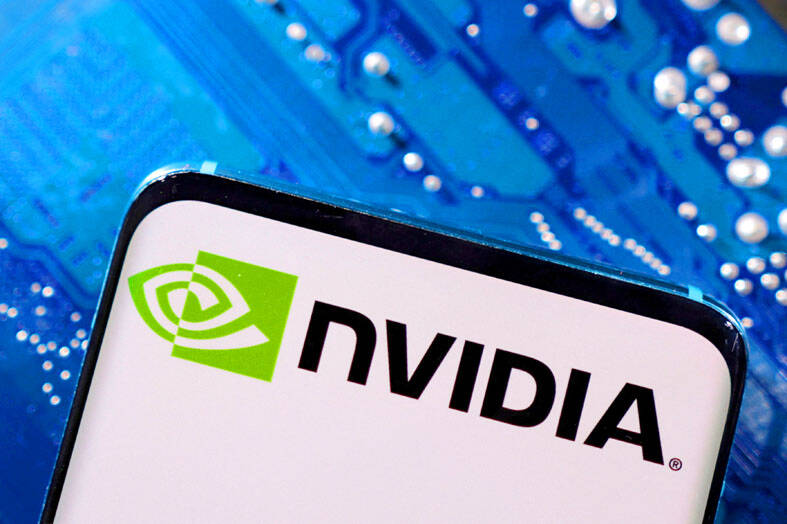Contract chipmaker Taiwan Semiconductor Manufacturing Co (TSMC, 台積電) and Taiwanese electronic components giant Hon Hai Precision Industry Co (鴻海精密) are among the world’s leading companies that have adopted US chip designer Nvidia Corp’s RTX Pro Servers to accelerate artificial intelligence (AI) reasoning, physical AI and business workloads.
RTX Pro Servers, which are equipped with up to eight Nvidia RTX Pro 6000 Blackwell Server Edition graphics processing units, are available in multiple configurations from the world’s major system suppliers, Nvidia said.
Enterprise users are adopting Nvidia RTX Pro Servers to transition from general-purpose clusters to AI factory infrastructure without a complete data center overhaul, it said.

Photo: Reuters
“The age of AI has arrived — and enterprises can no longer rely on classical servers alone. They must re-architect for AI,” Nvidia founder and CEO Jensen Huang (黃仁勳) said in a statement. “Nvidia RTX Pro is the computing platform built for this moment — running today’s [information technology] IT workloads while powering the AI agents that will transform every company and every industry.”
Leading global enterprises — including Taiwan’s TSMC, Hon Hai, Pegatron Corp (和碩), Quanta Cloud Technology Inc (雲達科技) and Wistron Corp (緯創); Germany’s Siemens SE; Japan’s Hitachi Ltd; South Korea’s Hyundai Motor Group; and the US’ Walt Disney Co and Eli Lilly & Co — have adopted Nvidia RTX Pro Servers, Nvidia said.

SEMICONDUCTORS: The German laser and plasma generator company will expand its local services as its specialized offerings support Taiwan’s semiconductor industries Trumpf SE + Co KG, a global leader in supplying laser technology and plasma generators used in chip production, is expanding its investments in Taiwan in an effort to deeply integrate into the global semiconductor supply chain in the pursuit of growth. The company, headquartered in Ditzingen, Germany, has invested significantly in a newly inaugurated regional technical center for plasma generators in Taoyuan, its latest expansion in Taiwan after being engaged in various industries for more than 25 years. The center, the first of its kind Trumpf built outside Germany, aims to serve customers from Taiwan, Japan, Southeast Asia and South Korea,

Gasoline and diesel prices at domestic fuel stations are to fall NT$0.2 per liter this week, down for a second consecutive week, CPC Corp, Taiwan (台灣中油) and Formosa Petrochemical Corp (台塑石化) announced yesterday. Effective today, gasoline prices at CPC and Formosa stations are to drop to NT$26.4, NT$27.9 and NT$29.9 per liter for 92, 95 and 98-octane unleaded gasoline respectively, the companies said in separate statements. The price of premium diesel is to fall to NT$24.8 per liter at CPC stations and NT$24.6 at Formosa pumps, they said. The price adjustments came even as international crude oil prices rose last week, as traders

SIZE MATTERS: TSMC started phasing out 8-inch wafer production last year, while Samsung is more aggressively retiring 8-inch capacity, TrendForce said Chipmakers are expected to raise prices of 8-inch wafers by up to 20 percent this year on concern over supply constraints as major contract chipmakers Taiwan Semiconductor Manufacturing Co (TSMC, 台積電) and Samsung Electronics Co gradually retire less advanced wafer capacity, TrendForce Corp (集邦科技) said yesterday. It is the first significant across-the-board price hike since a global semiconductor correction in 2023, the Taipei-based market researcher said in a report. Global 8-inch wafer capacity slid 0.3 percent year-on-year last year, although 8-inch wafer prices still hovered at relatively stable levels throughout the year, TrendForce said. The downward trend is expected to continue this year,

Taiwan Semiconductor Manufacturing Co (TSMC, 台積電), which supplies advanced chips to Nvidia Corp and Apple Inc, yesterday reported NT$1.046 trillion (US$33.1 billion) in revenue for last quarter, driven by constantly strong demand for artificial intelligence (AI) chips, falling in the upper end of its forecast. Based on TSMC’s financial guidance, revenue would expand about 22 percent sequentially to the range from US$32.2 billion to US$33.4 billion during the final quarter of 2024, it told investors in October last year. Last year in total, revenue jumped 31.61 percent to NT$3.81 trillion, compared with NT$2.89 trillion generated in the year before, according to